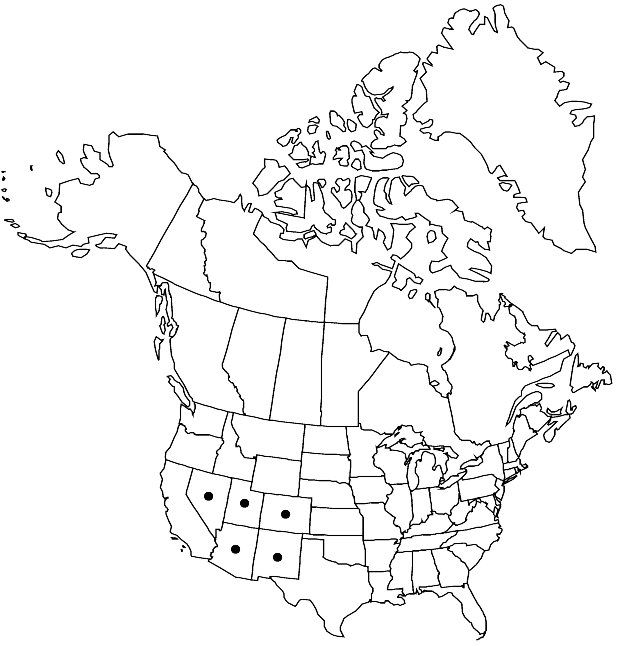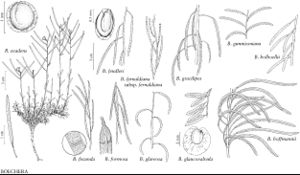Boechera fendleri
Phytologia 51: 370. 1982.
Perennials; short- to long-lived; sexual; caudex usually not woody (sometimes with persistent, crowded leaf bases). Stems 1–7 per caudex branch, arising from center of rosette near ground surface, or arising laterally proximal to sterile shoots, 1.5–5.5(–8) dm, densely pubescent proximally, trichomes simple and long-stalked, 2-rayed, 0.2–0.9 mm, glabrous distally. Basal leaves: blade broadly oblanceolate, 5–15(–20) mm wide, margins dentate, ciliate, trichomes (simple), to 1.2 mm, surfaces glabrous or pubescent, trichomes simple and long-stalked, usually 2-rayed, rarely some 3-rayed, 0.2–0.6 mm. Cauline leaves: 8–25, often concealing stem proximally; blade auricles 0.8–3 mm, surfaces of distalmost leaves often glabrous. Racemes 6–40(–74)-flowered, usually unbranched. Fruiting pedicels horizontal to divaricate-ascending, curved or angled downward, 9–18(–23) mm, usually glabrous, rarely sparsely pubescent, trichomes spreading, simple. Flowers ascending at anthesis; sepals sparsely hirsute; petals usually lavender, rarely white, 5–9 × 1–2 mm; pollen ellipsoid. Fruits widely pendent, not appressed to rachis, not secund, curved to nearly straight, edges parallel, 3–5.8 cm × 1.5–2 mm; valves glabrous; ovules 98–128 per ovary; style 0.2–0.5 mm. Seeds biseriate, 0.9–1.2 × 0.6–0.8 mm; wing distal (sometimes absent), 0.05–0.15 mm wide. 2n = 14.
Phenology: Flowering Apr–Jul.
Habitat: Rocky slopes in pine forests, pinyon-juniper woodlands, scrub oak
Elevation: 1800-2800 m
Distribution

Ariz., Colo., Nev., N.Mex., Utah.
Discussion
As circumscribed by R. C. Rollins (1993), Boechera fendleri included distinctive elements, segregated here as B. porphyrea, B. spatifolia, and B. texana (see M. D. Windham and I. A. Al-Shehbaz 2006, 2007 for detailed comparison). Boechera fendleri in the strict sense is a sexual diploid extending from the Four Corners region through northern Arizona to southern Nevada.
Selected References
None.
